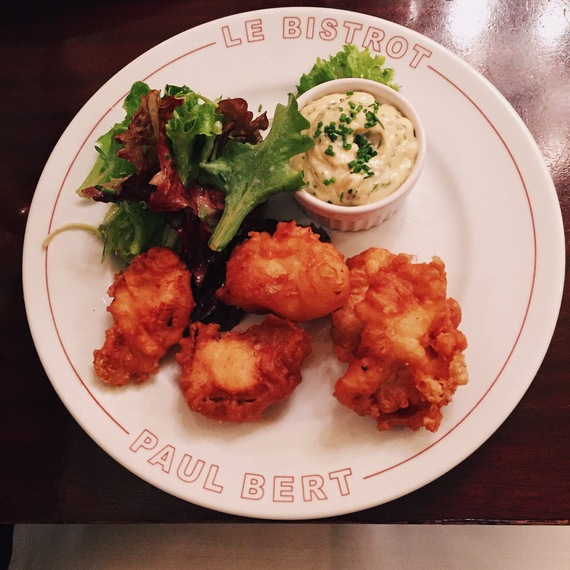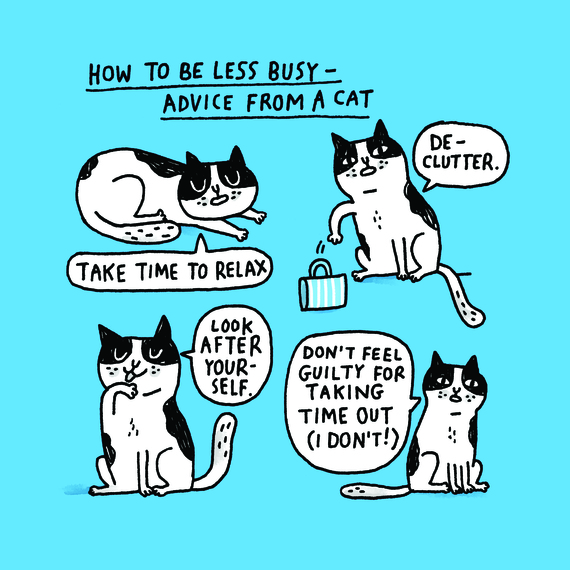Friday, October 30, 2015
Johnathan Joseph holds charity bowling event to raise awareness, fund lung cancer research
Vampire bats’ saliva is specially evolved for blood-feeding
Armed forces charities condemn MoD over veterans’ asbestos payouts
Ovarian cancer pill can help men
Living Color: 'The Fight of Your Life', Young Black Women on Breast Cancer
Indoor cycling community rallies around McKinney man with brain cancer
The Best Bites Abroad, Part 2 - Paris

I love reading about food, farmers' markets and wonderful restaurants almost as much as I enjoy going to them.
I keep a fantasy list of places to eat for unplanned future trips to places far away that I hope to get to. I tuck away my list of bakeries, food stands, restaurants and eateries, and as I do, the food journey begins. These potential spots wait in my food field trip file as a sort of percolator of future dreams.

Bistro Paul Bert is a place that comes up often, especially in lists made by chefs. It looks like my idea of a great French bistro, then solidly backs it up with its consistent, time-honored French food. It is Paris through and through, though you will hear English spoken, as well as many other languages, as everyone loves this gem. Although I am a purist, I'm not a gal who gravitates toward super-fine, high-level, white-glove dining, which is why I love a bistro--they are so unfussy. I prefer unpretentious restaurants filled with real people; I like to talk to food-lovers about the food, I prefer waiters who are approachable, and I like being able to lean over and ask the person at the table next to me what they love and what they recommend. Crowded, popular, a little noisy, Bistro Paul Bert has tables so close together that there's always the possibility of sitting next to interesting diners from a faraway land who you may end up sharing a rather intimate evening with.

Some of my favorite bites in Paris this spring were, well, everything thing we ate at Le Bistro Paul Bert.
This classic Paris bistro feels like it's been around forever with its amazing simple bistro fare, flawlessly executed. The waiter brings the daily menu on a large chalkboard and leans it on your table--once it comes you need to make your decision quickly because the next table needs the chalkboard too. I love when a restaurant concentrates on the ten or twelve dishes they execute flawlessly. There were three of us, and we each took advantage of three courses, so we tried a wide selection. The place itself is not a lot to look at, but the food that they do on a daily basis is solid: soulful, rich but not heavy, authentic.

Spring asparagus with shavings of parmesan and a perfectly cooked egg on top began this feast. Standouts included the amazing sole meuirre, so simple, yet so complicated to execute perfectly. The scallops in the shell were like a little masterpiece of perfection in a butter sauce. The monkfish fritters were crunchy and light, served with a homemade tartar sauce. We split a thick medium rare ribeye on the bone with a staggeringly good au jus. We pretty much had to fist fight over that ribeye. We ended with a chocolate soufflé and crepes Suzette: SO French, so exquisite, so perfect. It's a must-do bistro for any trip to Paris, and I recommend making a reservation right this second.
For more mouthwatering recipes and fabulous food adventures, join ReadSource on Facebook or follow the author on Instagram @nocrumbsleft.
-- This feed and its contents are the property of The Huffington Post, and use is subject to our terms. It may be used for personal consumption, but may not be distributed on a website.
10 Must-Do Health Checks For Women Over 50
* Mammogram. More than 3 million cases of breast cancer are diagnosed each year in the United States, with most of those occurring in women ages 40 and older. Regular mammograms are a key early detection tool. Early detection, combined with new treatments and a better understanding of the disease, have led to much improved survival rates.
* BRCA1 and BRCA2 testing. If you have a strong family history of breast cancer, ovarian cancer, or peritoneal cancer, you should speak with your doctor about getting tested for the BRCA1 or BRCA2 mutation. Studies show that BRCA1 and BRCA2 mutations account for about 5 percent to 10 percent of all breast cancers and 15 percent of ovarian cancers overall.
* Pap Smear. Women are advised to get a pap smear every three years until the age of 65. Pap smears help detect cervical cancer. Most doctors suggest that women over the age of 65 can stop having pap smears, so long as the patient had at least three negative tests in the past 10 years, or if she has had a hysterectomy.
* Colonoscopy. Women under the age of 75 are advised to get a colonoscopy to look out for colorectal cancer. One of the main benefits of a colonoscopy is that doctors can remove small polyps during the procedure before they become cancerous. According to the American Cancer Society, nine out of 10 people whose colon cancer is discovered early will be alive five years later.
* Depression. It's totally normal to feel sad occasionally, but if you find yourself feeling hopeless or having a lack of interest or pleasure in doing things for more than two weeks, you might be depressed. It's important to talk to your doctor about being screened for depression. As we age, emotional health is just as important as physical health.
* Blood Glucose. It's important to have your blood sugar levels tested regularly to see if you have diabetes. This is especially important if you have high blood pressure or if you take medication for high blood pressure. Diabetes, if untreated, is a particularly insidious disease that can affect the heart, brain, eyes, feet, kidneys, and nerves.
* Cholesterol. Are you a tobacco user or overweight? Do you have a personal history of heart disease or blocked arteries? Do you have a male relative in your family that had a heart attack before age 50 or a female relative before age 60? If any of these factors apply to you, consult your doctor about getting your cholesterol levels checked. High cholesterol is one of the major risk factors leading to heart disease, heart attack and stroke.
* Blood Pressure. Women over the age of 50 should have their blood pressure checked at least every two years. High blood pressure is a concern because it can lead to coronary heart disease, heart failure, stroke, kidney failure, and other health problems.
* Chest X-Ray. If you are a smoker, quitting smoking is one of the best health moves you can make. People aged between 55 and 80 that have a 30-pack-per-year smoking history, or smoke now or have quit within the past 15 years should talk to their doctors about being screened for lung cancer. Currently, the only approved screening for lung cancer is a chest x-ray.
* DEXA Scan. A DEXA scan is critical for determining whether you have osteoporosis. Screening is recommended starting at age 65. Osteoporosis cannot be cured, but treatment can help make the condition more bearable.
All of these health checks are important, but it's crucial to maintain a strong relationship with your doctor or healthcare provider. Keep up your good health to make the most of your Golden Girls years!
Bonnie Moore, 70, is the President and Founder of Golden Girls Network, the only nationwide network that helps mature adults find roommates and access the resources they need to make shared living work. She is also the author of How to Start a Golden Girls Home.
*This article first appeared on the Golden Girls Network blog.
Earlier on Huff/Post50:
-- This feed and its contents are the property of The Huffington Post, and use is subject to our terms. It may be used for personal consumption, but may not be distributed on a website.
Your open enrollment guide for 2016 healthcare plans
Thursday, October 29, 2015
Lung cancer variations 'unacceptable'
Simulation of 3-D exotic clouds on an exoplanet
Drugs 'costing pennies' could help those with breast cancer, Parkinson's disease and MS, experts say
A.M. Best Special Report: Asbestos & Environmental Losses Drop Sharply in 2014, But Funding Level Concerns Remain
Breast Cancer Rates for Blacks Catch Up to Whites
3 Surprising Ways to Feel Less Busy

Busyness stinks.
Although people tell me all the time they like feeling busy -- perhaps because it makes them feel important and significant -- I'm not buying it. Would you ever choose busyness over a more relaxed form of productivity? When life starts to feel hectic, here are a few ways to dial back the overwhelm.
- Give yourself a shot of awe. When researchers induced feelings of awe in people -- by showing them video clips of people next to vast things like whales or waterfalls, it altered their perception of time such that they -- those people felt like they had more time on their hands. So much time on their hands, in fact, that awe-struck people become likely to give away their time by volunteering to help someone out. They also report fewer feelings of impatience.
Not sure where to find yourself some awe? Look no farther than YouTube. Try searching "awe" and "whales," or just watch this oldie but goodie video clip -- it makes me feel awestruck every time. If the concept of "awe" feels too abstract, try thinking about things that amaze you. What makes you feel a childlike sense of wonder? Makes you feel elevated or inspired? Now take five minutes to let one of those things work their magic on your busy brain.
- Create an anti-busyness ritual. Researchers believe that the brains in both humans and animals evolved to feel calmed by repetitive behavior, and that our daily rituals are a primary way to manage stress. This is especially true in unpredictable environments or situations where we feel pressured, a lack of control, or threatened in some way.
When the pace of life seems to be taking off without you, create a ritual to help you feel more in control. What counts as a ritual? Something you do repetitively in certain situations -- usually a series of behaviors done in the same order. Think of your favorite ball player's pregame ritual.
When I start to feel pressured for time, my own "busyness ritual" kicks in: I stretch my neck (first by looking to the left, and then to the right, and then by tipping my left ear to my left shoulder and my right ear to my right shoulder). I exhale deeply with each stretch, and then center my head, and straighten my posture. On my last exhale, I think to myself: "I have plenty of time." The stretching and deep breathing may be what helps me feel calm, but also having and using a ritual -- any ritual -- can help us feel more in control and less overwhelmed. - Find "flow." Dropping into "the zone" or finding flow is the opposite of feeling busy. Time seems to stand still -- if we are aware of time at all. Finding flow isn't as elusive a state as you might think, but it does require that we stop multi-tasking, and that we build a fortress against interruption around ourselves. (I also have a "get into the flow" ritual that I use before I write).
I know, I know. You don't have time to foster awe, or create an anti-busyness ritual, or stop multi-tasking. You're too busy!
Listen: You don't have time NOT to do these things. Busyness is a mark of what neuroscientists call "cognitive overload." This state impairs our ability to think creatively, to plan, organize, innovate, solve problems, make decisions, resist temptations, learn new things easily, speak fluently, remember important social information, and control our emotions. In other words, it impairs basically everything we need to do in a given day. So if you have important work to do, please: Take five minutes to dial back your busyness.
***
If you liked this post, you'll love this short and funny documentary, HumanKinda. The premise is that busyness robs us of our humanity, making us only "kinda" human.
Christine Carter, Ph.D., is a sociologist at UC Berkeley's Greater Good Science Center and the author of The Sweet Spot (2015) and Raising Happiness (2011). Check out more of her award-winning advice here.
Photo credit: Gemma Correll commissioned by JetBlue for Humankinda.
-- This feed and its contents are the property of The Huffington Post, and use is subject to our terms. It may be used for personal consumption, but may not be distributed on a website.
Five Lessons U.S. Healthcare Can Learn From Baseball
2 More Major Companies Vow To Transition To Cage-Free Eggs
Two more major companies have committed to a more humane future by promising to use only cage-free eggs.
OK -- they won't actually be doing this until 2025. But it's still good news.
Kellogg's and TGI Fridays both released statements on Thursday announcing that within a decade, they'll be sourcing their eggs only from suppliers whose hens are cage-free.
It sounds like a long time away -- especially if you're one of the estimated 273 million egg-laying hens in this country. (In which case, congratulations on learning how to read.) But animal advocates say this is an important move and a strong signal to egg producers that today's cruel farming practices have a short shelf life.
"The impact of these policies is that no egg producer in their right mind will continue locking chickens in cages, which represents an earth-shattering turnaround in the industry," said Matt Prescott, senior food policy director for the Humane Society of the United States.
Caged chickens currently account for the majority of egg-laying hens in the United States. They live tightly packed in small cages, and are considered among the most mistreated farm animals.
Both Kellogg's and TGI Fridays also said they are moving toward eliminating another stomach-turning practice, pig gestation crates, from their respective supply chains, in an effort to fulfill the growing demand for better-treated animals.
"Today's announcement allows us to lead positive change in a way we know gives consumers more of what they want from brands and companies -- a strong focus on social responsibility," said Paul Norman, president of Kellogg North America, in a news release.
TGI Fridays spokesman Quinton Crenshaw expressed a similar sentiment.
“Animal welfare is important to Fridays and our guests and we believe this announcement reflects that commitment," he said in a press release. "Our company believes in operating responsibly in all aspects of our business, and ensuring a responsible supply chain is one way we can demonstrate that."
So, maybe with a little pressure -- hint, hint, all you eaters of cereal and attendees of happy hours -- these aims can be achieved a bit more quickly.
"When it comes to getting animals out of deplorably cruel conditions, of course the quicker the better. And we’re always working with companies to help them set initial timelines and speed up existing timelines," Prescott told The Huffington Post. "American consumers simply don’t want animals locked in tiny cages for their entire lives, and this is one way to better align the food system with those expectations."
Get in touch with this reporter at arin.greenwood@huffingtonpost.com if you have an animal story to share.
Also on HuffPost:
-- This feed and its contents are the property of The Huffington Post, and use is subject to our terms. It may be used for personal consumption, but may not be distributed on a website.
Wednesday, October 28, 2015
The sun is brightening, but not in China
CVS Health : American Lung Association's LUNG FORCE Aims to Defeat Lung Cancer with Promising Research
24 Fast Food Breakfasts That Aren't Terrible for You
Mammograms haven't cut rate of advanced breast cancer
Here's Why You Should NEVER Refrigerate Your Bread
Is your refrigerator running? Well, don't put your bread in it.
The truth is, if you want to keep your bread fresher for longer, wrapping it in plastic and storing it in the fridge is the worst thing you can do.
It sounds counter-intuitive (no pun intended), seeing as how refrigerators were invented to help us preserve the freshness of food. So to understand why, Serious Eats broke it down into the science of "retrogradation and recrystallization of starch," a complicated way of saying that during a bread's lifetime (which begins when a bread cools after being heated during baking), its starches (which were rearranged when baked) will regroup back to their original, crystallized state. Thus, your bread becomes hard, or stale.
Putting it into the fridge simply hustles this process along.
So what should you do if you want you cherish your bread longer?
David Norman, of Austin's popular bakery and beer garden, Easy Tiger, said to start by buying whole loaves, not sliced bread, as a bread's shelf life is significantly reduced once it's sliced. Cut off what you want to eat, and if you're planning on finishing the loaf in the next couple days, set the loaf cut-side down against the table, he told The Kitchn.
Say you bought your bread in bulk? The best way to halt that recrystallization process is to keep it in the freezer: Wrap it in an airtight container or bag to store it; then let it completely thaw before taking it back out of the container.
To see how long your loaf might last, check out this handy chart by Eat By Date.
Also on HuffPost:
-- This feed and its contents are the property of The Huffington Post, and use is subject to our terms. It may be used for personal consumption, but may not be distributed on a website.
Global Brain Cancer Partnering 2010-2015 - Reportlinker Review
5 Types of Bacteria, 2 Vaccine Types, 1 Important Decision for Parents
Meningococcal disease is a bacterial infection that causes meningitis (brain swelling) or sepsis (blood infection). Serogroup B is just one of several types of bacteria that cause the disease and the only one included in its own vaccine. Four other serogroups (A, C, W, and Y) are included in a vaccine recommended for all children at age 11 to 12 years with a booster at age 16 years. Because it behaves somewhat differently, the B serogroup could not be included in the ACWY vaccine, and it took longer for scientists to design an effective vaccine.
While the ACWY vaccine recommendation and most others are for routine vaccination of all children based on age, the serogroup B vaccine recommendation allows for individual decision-making. Parents who want their children protected from serogroup B disease should have them vaccinated at 16 to 18 years of age, or up to age 23. This coincides with a period of increased risk for getting meningococcal disease.
I addressed the rationale for this permissive recommendation at length previously. Because this disease is rare, routine vaccination of every teen in this country would not be cost effective as a public health measure. However, because it is also very severe when it does strike, we want to make sure vaccination is available for any family that wants it for their children.
The permissive recommendation achieves three important goals: It tells all U.S. health care professionals to be prepared to give the vaccine upon patient/parent request; it provides public funding for those who cannot afford the vaccine; and it facilitates coverage for the vaccine under the Affordable Care Act by private insurers.
Here are a few facts to help parents make this important decision:
• Meningococcal disease is rare in the U.S. Cases are at an all-time low in the U.S. (fewer than 600 in recent years), but this disease has been cyclical in the past. Cases ebb and flow and no one can say if, or when, they may increase. The low number of cases could be due, at least in part, to high ACWY vaccination rates.
• Meningococcal disease is one of the most severe vaccine-preventable diseases. Even with rapid medical care, at least one in 10 young people with meningococcal disease will die in as little as 24 to 48 hours and two more will have severe and permanent complications such as brain damage, hearing loss, kidney failure, and limb amputations.
• Adolescents and young adults are at increased risk of getting meningococcal disease because of situations and behaviors common in this age group, such as gathering in large social groups, close physical contact, living in close quarters such as camps or college dormitories, kissing, and smoking or exposure to second-hand smoke.
What Parents Should Do
Educate yourselves and talk to your health care provider to decide if the serogroup B vaccine is right for your children. You can read more about meningococcal disease and serogroup B in particular at reputable medical sites, like CDC and the National Foundation for Infectious Diseases.
Make sure your children are up-to-date on all recommended vaccines. Eight in 10 adolescents get their first dose of the ACWY vaccine, but only three in 10 come back for the booster at age 16 years. Both doses are essential to protect them through the most vulnerable years. If your teen isn't fully vaccinated, make an appointment today!
-- This feed and its contents are the property of The Huffington Post, and use is subject to our terms. It may be used for personal consumption, but may not be distributed on a website.
Mammograms haven't cut rate of advanced breast cancer
Bankers Healthcare Group Presents The 2015 Excellence In Health Care Awards, Congratulates This Year's Honorees
Mesothelioma Death Lawsuit Over Second-Hand Asbestos Exposure Results in $3.5M Verdict
Tuesday, October 27, 2015
Medication dose needed for general anesthesia varies widely: Some patients may require less anesthesia
Dako, an Agilent Technologies Company, Announces FDA Approval of New Test for Lung Cancer Patients
19 Healthy Foods That Can Make You Feel Gross
Fossil fuel firms risk plague of 'asbestos' lawsuits
Gwyneth Paltrow under fire for breast cancer post
N.J. family of boy with brain cancer struggling for house, help
6 Reasons You Should Eat Chocolate Every Day Of Your Life
"All you need is love. But a little chocolate now and then doesn't hurt."
Though chocolate lovers everywhere will absolutely agree with this sentiment, frankly, it undersells chocolate. This sweet is capable of much more than simply "not hurting" you -- it can help you. In fact, there are scientifically-backed studies that prove chocolate can help you live a better life (and we're not just talking about the happiness you derive from its deliciousness).
In honor of National Chocolate Day on Oct. 28, we've rounded up six of the most wonderful excuses to eat chocolate every day. It's great for your skin, can give you a boost in math class, and can even increase your chances of winning a Nobel Prize. To find out more ways chocolate can improve your life, watch the video above.
Related on HuffPost:
-- This feed and its contents are the property of The Huffington Post, and use is subject to our terms. It may be used for personal consumption, but may not be distributed on a website.
Why Healthcare Wearables Are Out Of Reach For People Who Need Them Most
This Comic Perfectly Captures What Life Is Like After A Breakup
When his relationship ended after two years in 2014, Brandon Sheffield felt like there was a "very specific person-sized hole" in his life.
To cheer himself up, the Oakland, California-based video game director started writing little vignettes about his experiences, documenting everything from how awkward he felt going out sans-girlfriend to how depressing it was to crawl into bed alone.
"I noticed there were certain patterns to the way I felt and sort of rolled around through my days," Sheffield told HuffPost. "But I also realized that even though my emotional wounds were specific to me, the way I was acting was very similar to what I'd seen friends go through."
Realizing how universal his routine was, Sheffield asked his friend, New York-based illustrator Dami Lee, to turn the stories into comic strips -- a project they'd eventually call No Girlfriend Comics.
"She added bits of herself here and there, which I think made the comic more relatable and not just for dudes," Sheffield said of his collaboration with Lee, who was living in Seoul, Korea at the time.
(Story continues after the comic.)
The sweetly relatable comics -- which ran on the site Tapastic from early August to December 2014 -- touched a nerve with readers, so much so that when Sheffield and Lee wrapped up the series after 20 installments, their audience wanted more.
"People complained when the series ended because they really wanted Brandon (the character) to stay miserable!" Lee told HuffPost,"But it felt right to end it at 20 comics instead of continuing the series; it represented a passing phase that everyone goes through at some point. The comic came to its natural end, just like a lot of relationships."
See some of our favorite installments below, then head to Tapastic to read the comic series in its entirety.
More From HuffPost:
-- This feed and its contents are the property of The Huffington Post, and use is subject to our terms. It may be used for personal consumption, but may not be distributed on a website.
Prostate cancer charitable 5K set for Saturday
Monday, October 26, 2015
Keytruda improves lung cancer survival in new study
Mycologist says our close relatives break the bounds of biology
Processed Meat Causes Cancer, WHO Group Says
How to Find the Gifts in Chaos

I looked up the definition of chaos the other day and here's what I found:
1. A condition or place of great disorder or confusion.
2. A disorderly mass; a jumble
3. Chaos: The disordered state of unformed matter and infinite space supposed in some cosmogonic views to have existed before the ordered universe.
If you pay attention to headlines, it's easy to get caught up in the sense that life is spinning out of control. Global warming is swallowing up islands. People have to flee their homelands to avoid famine or torture. Police officers are getting shot while making regular traffic stops. Financial markets flipping and flopping like a trout just yanked out of water. The train is speeding along but it looks like no one's at the helm!
Chaos can be crazy-making, but it's actually a very healthy part of the cycle of life. It sweeps away the old and makes space for the new. Chaos creates the opening for new possibilities. It all depends on your approach to it.
Compare these two quotes:
Septima Poinsette Clark, educator and civil rights activist
"Living in continual chaos is exhausting, frightening. The catch is that it's also very addictive."
Lorna Luft, actress
Will chaos be a gift, an exhausting addiction or maybe just an unpleasant disruption in your life? Personally, I use chaos as a precious gift. To experience that more fully, ask yourself the following four questions:
Is this my chaos to handle?
It's tragic when a police officer is shot and none of us like seeing the changes global warming has created. But which parts of the chaos around us is truly ours to get involved with? As global citizens, we can care about others and do what we can to assist or support. But personally taking on chaos or problems that are not yours can be a trap, distracting you from the life you are meant to live and the issues you are meant to impact.
This especially applies to chaos created by friends or family members. Does their chaos really belong to you? Should you dive into your sister's messy divorce or shoulder responsibility for your buddy's shaky employment status? Is it even helpful that you get involved? A simple question to ask yourself: Is this really mine to do? If the answer is "yes," dive in! If not, step back.
Do you have control over the chaos?
Not all chaos is equal! You can control or impact some of it, like the mess in your garage or the craziness of your checkbook. But unless your last name is Lagarde or Yellen, you don't have much say over global financial markets -- and nobody controls the weather.
For chaos you cannot control, you've got a couple of options: 1) Accept it as it is and make peace with it. Find a way to enjoy the storm or be comfortable within the unknown of a difficult diagnosis. 2) Do what you can to minimize the impact of the chaos on you personally. Find less volatile places to stash your money or step away from a dysfunctional relationship.
For chaos you can control, ask yourself the next question:
Is it time to float or swim?
Chaos can be messy and sometimes it just has to stay that way for a while. Something new might be trying to emerge and it might take a while. When you've experienced a great loss, like the death of a loved one, a divorce, or losing a job, it's important to sit back and re-group. Our knee-jerk reaction to do something -- anything! -- to avoid the discomfort of chaos often leads to bad decisions. Wait until you feel more grounded and guided before taking major steps.
You'll know it's time to start swimming again when the action you want to take is a positive move toward your next chapter, not just pulling away from the chaos.
How can I be more Pono within this chaos?
"Pono" is a Hawaiian word that basically means to be right with the world, comfortable in your own skin, aligned with who you really are. When you're pono, you become the eye of the storm, calm and steady no matter what is flying around you.
When you're pono, it's easy to see your priorities and stay true to your values. When you're pono, it's easy to feel calm during chaos and to distinguish between chaos you can control and chaos you can't. When you feel pono, you know whether you should take action or whether it's time to chill and let it unfold. When you're pono, you're able to absorb the lessons, the gifts the chaos offers.
I invite you to try these four questions in the midst of chaos. You just might find yourself joining Bob Dylan and singing:
To your TOTAL empowerment!
Mahalo,
Dr. Matt
Got questions? Please respond here or contact me through my Facebook fan page or my blog.
Matthew B. James, MA, Ph.D., is President of The Empowerment Partnership. Author of several books, Dr. Matt has trained thousands of students to be totally empowered using Neuro Linguistic Programming (NLP), Huna, Mental Emotional Release® (MER®)therapy, and Empowerment Fit, a program that incorporates targeted mind/body/spirit practices to create optimal physical fitness and health. Download his free NLP class. For more about Dr. Matt, visit his blog at www.DrMatt.com.
For more articles by Dr. Matt, click here.
-- This feed and its contents are the property of The Huffington Post, and use is subject to our terms. It may be used for personal consumption, but may not be distributed on a website.